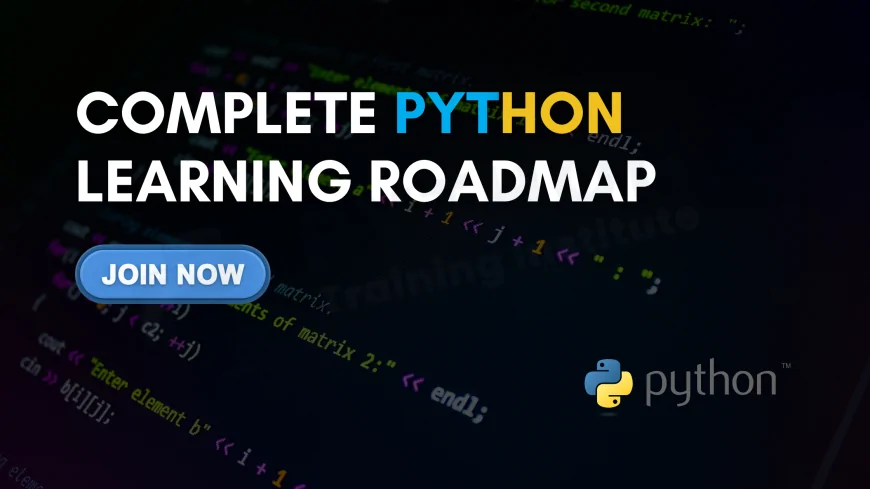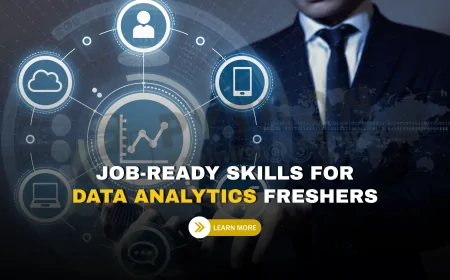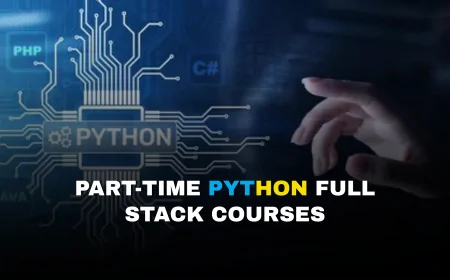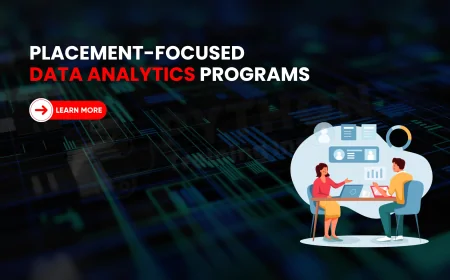Comprehensive Roadmap for Learning Python Programming | From Beginner to Pro
Explore a complete roadmap for learning Python programming, from mastering the basics to advanced skills. Discover how structured Python courses in Pune can help boost your career in software development, data science, and web development.

Python has emerged as one of the most versatile and widely-used programming languages in the tech industry. Its simplicity and readability make it an excellent choice for beginners, while its powerful libraries and frameworks cater to advanced applications in web development, data science, artificial intelligence, and more. This roadmap is designed to guide you through the journey of learning Python programming, from the basics to advanced topics, without referencing specific institutions or universities.
Understanding the Importance of Python
Python's rise in popularity is attributed to its simplicity, readability, and vast community support. It's used in various domains, including web development, data analysis, artificial intelligence, scientific computing, and automation. Learning Python opens doors to numerous career opportunities and allows you to work on diverse projects.
Setting Up Your Python Environment
Before diving into coding, it's essential to set up a conducive environment:
-
Install Python: Download the latest version of Python from the official website.
-
Choose an IDE or Text Editor: Popular choices include VS Code, PyCharm, and Sublime Text.
-
Use Virtual Environments: Tools like
venvorvirtualenvhelp manage dependencies for different projects. -
Familiarize with the Command Line: Basic command-line skills are invaluable for navigating directories and running scripts.
Mastering Python Fundamentals
A strong foundation in Python's core concepts is crucial:
-
Variables and Data Types: Understand integers, floats, strings, booleans, lists, tuples, sets, and dictionaries.
-
Operators: Learn arithmetic, comparison, logical, and bitwise operators.
-
Control Flow: Master
if,elif,elsestatements, loops (for,while), and loop control statements (break,continue,pass). -
Functions: Define and call functions, understand scope, and use
*argsand**kwargs. -
Comprehensions: Use list, set, and dictionary comprehensions for concise code.
Diving into Data Structures and Algorithms
Proficiency in data structures and algorithms enhances problem-solving skills:
-
Data Structures:
-
Lists: Dynamic arrays for storing sequences.
-
Tuples: Immutable sequences.
-
Sets: Unordered collections of unique elements.
-
Dictionaries: Key-value pairs for efficient lookups.
-
-
Algorithms:
-
Sorting: Implement bubble sort, merge sort, quicksort.
-
Searching: Understand linear and binary search.
-
Recursion: Solve problems by breaking them into subproblems.
-
Dynamic Programming: Optimize recursive solutions by storing intermediate results.
-
Exploring Object-Oriented Programming
Object-Oriented Programming (OOP) allows for modular and reusable code:
-
Classes and Objects: Define classes and create object instances.
-
Attributes and Methods: Differentiate between instance and class variables; define methods.
-
Inheritance: Create subclasses that inherit from parent classes.
-
Encapsulation: Restrict access to methods and variables.
-
Polymorphism: Use methods that act differently based on the object.
Working with Modules and Packages
Modular programming enhances code organization:
-
Modules: Create and import Python files containing functions and variables.
-
Packages: Organize modules into directories with
__init__.py. -
Standard Library: Utilize built-in modules like
math,datetime,os, andsys. -
Third-Party Packages: Use
pipto install external libraries.
Handling Exceptions and Errors
Robust programs handle unexpected situations gracefully.
-
Try-Except Blocks: Catch and handle exceptions.
-
Finally Clause: Execute code regardless of exceptions.
-
Raising Exceptions: Use
raiseto trigger exceptions. -
Custom Exceptions: Define user-specific error types.
File Handling and Working with Databases
Interacting with files and databases is a common requirement:
-
File Operations:
-
Reading/Writing Files: Use
open(),read(),write(), andclose(). -
Context Managers: Employ
withstatements for file operations.
-
-
Databases:
-
SQLite: Use the
sqlite3module for lightweight database operations. -
CRUD Operations: Implement Create, Read, Update, Delete functionalities.
-
Understanding Web Development with Python
Python offers frameworks for building web applications:
-
HTTP Protocol: Understand how web communication works.
-
Web Frameworks:
-
Flask: A micro-framework for small applications.
-
Django: A high-level framework for larger projects.
-
-
Templates: Use templating engines like Jinja2 for dynamic content.
-
APIs: Create RESTful APIs for communication between services.
Delving into Data Science and Machine Learning
Python is a leading language in data analysis and AI.
-
Libraries:
-
NumPy: Handle numerical computations.
-
Pandas: Manipulate and analyze data structures.
-
Matplotlib/Seaborn: Visualize data through charts and graphs.
-
Scikit-learn: Implement machine learning algorithms.
-
-
Projects:
-
Data Cleaning: Handle missing or inconsistent data.
-
Model Building: Train and evaluate predictive models.
-
Data Visualization: Present insights through visual representations.
-
Automating Tasks with Python
Automation enhances productivity:
-
Scripting: Write scripts to automate repetitive tasks.
-
Web Scraping: Use libraries like
requestsandBeautifulSoupto extract data from websites. -
Automating Emails: Send automated emails using
smtplib. -
Scheduling Tasks: Automate task execution using
scheduleorcronjobs.
Testing and Debugging Your Code
Ensuring code reliability is paramount:
-
Debugging Tools: Use
pdbfor step-by-step code execution. -
Unit Testing: Write tests using the
unittestframework. -
Test Coverage: Measure the extent of code tested.
-
Continuous Integration: Automate testing processes in development workflows.
Version Control and Collaboration
Managing code changes and collaborating with others is essential:
-
Git: Track changes and manage code versions.
-
Repositories: Host code on platforms like GitHub or GitLab.
-
Branching and Merging: Work on features independently and integrate changes.
-
Pull Requests: Review and discuss code changes before merging.
FAQ's
1. What is the best roadmap for learning Python programming?
A well-structured Python learning roadmap should start with the basics, like syntax and data types. Then, progress to functions, libraries, object-oriented programming, and frameworks like Flask or Django. Finally, focus on projects, problem-solving, and real-world applications. Joining a Python Training Institute in Pune can accelerate this process and provide expert guidance.
2. How long will it take to master Python programming?
The time required to master Python depends on your prior programming knowledge and commitment. With consistent practice, you can learn the basics in a few months and advance to more complex topics in 6-12 months. Enrolling in a structured Python course in Pune can fast-track your learning and skill development.
3. What are the key skills to learn in Python programming?
Key skills include understanding Python syntax, data structures, object-oriented programming, and key libraries like NumPy and pandas. You should also learn web frameworks (Flask/Django), automation, and data science. A Python course in Pune can help you gain these skills in a focused environment with hands-on projects.
4. Is Python good for beginners in programming?
Yes, Python is often recommended for beginners due to its simple, readable syntax. It offers a smooth learning curve compared to other languages. Enrolling in a Python Training Institute in Pune helps beginners build a strong foundation with expert guidance and structured learning paths.
5. How do I start learning Python programming?
Begin with basic concepts such as variables, loops, and data types. Move on to functions, control flow, and libraries. Practical projects can deepen understanding. A Python Training Institute in Pune can provide structured lessons, hands-on practice, and guidance to ensure you start with the right foundation.
6. Should I learn Python for data science or web development first?
It depends on your career goals. If you’re interested in data analysis or machine learning, start with data science-focused libraries like NumPy and pandas. For web development, start with Flask or Django. Python courses in Pune often offer tracks for both fields, allowing you to choose based on your interests.
7. How does Python training benefit my career?
Python is a highly in-demand skill across various fields like data science, web development, and automation. Gaining proficiency through a Python training course in Pune will make you eligible for roles like software developer, data analyst, or machine learning engineer, significantly enhancing your career prospects.
8. Are there any prerequisites for learning Python?
No formal prerequisites are required to start learning Python. However, understanding basic programming concepts, logic, and problem-solving skills is helpful. A Python course in Pune will guide you through every concept, even if you're new to coding, ensuring you grasp the fundamentals effectively.
9. Can I learn Python programming online?
Yes, there are many online resources to learn Python, but enrolling in an institute offers structured, hands-on learning with guidance from experienced instructors. A Python Training Institute in Pune provides a more interactive learning environment with expert support, which is often missing in self-paced online courses.
10. What are some good Python projects for beginners?
Some beginner Python projects include building a calculator, creating a to-do list app, or developing a simple game like tic-tac-toe. These projects help reinforce your understanding. Python institutes in Pune provide real-world projects, enabling you to enhance your practical coding skills and build a portfolio.
11. What is the best Python framework for web development?
For web development, Django and Flask are the two most popular Python frameworks. Django is best for large-scale applications, while Flask is ideal for smaller projects. A Python course in Pune will offer in-depth tutorials on both, helping you choose the best framework based on your career interests.
12. How can I improve my Python programming skills?
Continuous practice, solving coding problems on platforms like LeetCode or HackerRank, and building projects are effective ways to improve your skills. Joining a Python training institute in Pune gives you access to expert mentors who can guide you through complex problems and real-world applications.
13. What libraries should I focus on when learning Python?
Some essential libraries to learn include NumPy, pandas, Matplotlib, and TensorFlow for data science, and Flask or Django for web development. A Python course in Pune typically covers these libraries in-depth, offering hands-on experience to help you build projects using these tools.
14. Is Python used for machine learning?
Yes, Python is the most popular language for machine learning due to its rich ecosystem of libraries like TensorFlow, Keras, and scikit-learn. A Python training course in Pune can guide you through these libraries, offering you practical experience to implement machine learning models.
15. How do I prepare for Python certification exams?
To prepare for Python certification exams, focus on mastering core Python concepts, coding challenges, and relevant libraries. Enroll in a Python training course in Pune to receive structured guidance and support, helping you build a strong foundation before attempting the certification.
16. What are the job opportunities after learning Python?
After mastering Python, you can pursue roles like software developer, data analyst, machine learning engineer, and web developer. Python Training Institutes in Pune offer placement assistance, ensuring you are prepared for interviews and job opportunities, increasing your chances of securing a job in top tech companies.
17. Can I learn Python without any programming experience?
Yes, Python is beginner-friendly and can be learned without prior programming experience. A structured Python course in Pune can help guide beginners through the language's concepts, starting from the basics and gradually moving to advanced topics, ensuring a solid understanding of Python.
18. How do Python courses in Pune help with career advancement?
Python courses in Pune provide practical, hands-on training, industry-oriented projects, and placement assistance, making it easier for you to transition into tech roles. By gaining Python expertise, you'll be eligible for high-paying positions, including roles in software development, data science, and automation.
19. What are the advanced topics in Python programming?
Advanced Python topics include multithreading, asynchronous programming, design patterns, and advanced libraries like PyTorch and Celery. A Python course in Pune covers these advanced concepts, preparing you for specialized roles in fields like data science, AI, or web development.
20. How do I stay updated with Python programming trends?
To stay updated, follow Python blogs, join coding communities, and attend webinars. Python Training Institutes in Pune often organize workshops and events to help students stay current with the latest trends in Python and related technologies, allowing you to stay ahead in the field.
Key Takeaways
A clear and structured roadmap for learning Python programming can significantly enhance your skills and accelerate your journey to becoming a proficient programmer. Start with the fundamentals such as syntax and basic data structures, then gradually move towards advanced concepts like object-oriented programming, web frameworks, and data science.
For those serious about building a strong Python foundation and career, enrolling in a Python Training Institute in Pune offers expert guidance, hands-on projects, and access to industry professionals. With continuous practice and real-world application, Python can open doors to a variety of career opportunities in fields like software development, data analysis, machine learning, and web development. Keep learning, stay curious, and embrace the evolving world of Python programming!
What's Your Reaction?
 Like
0
Like
0
 Dislike
0
Dislike
0
 Love
0
Love
0
 Funny
0
Funny
0
 Angry
0
Angry
0
 Sad
0
Sad
0
 Wow
0
Wow
0















